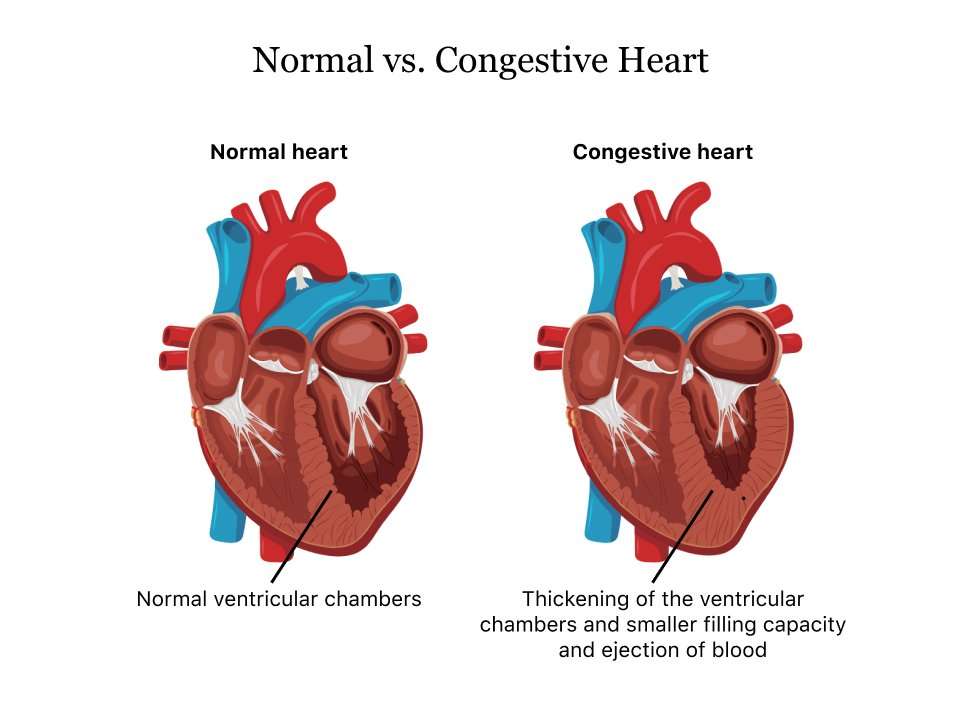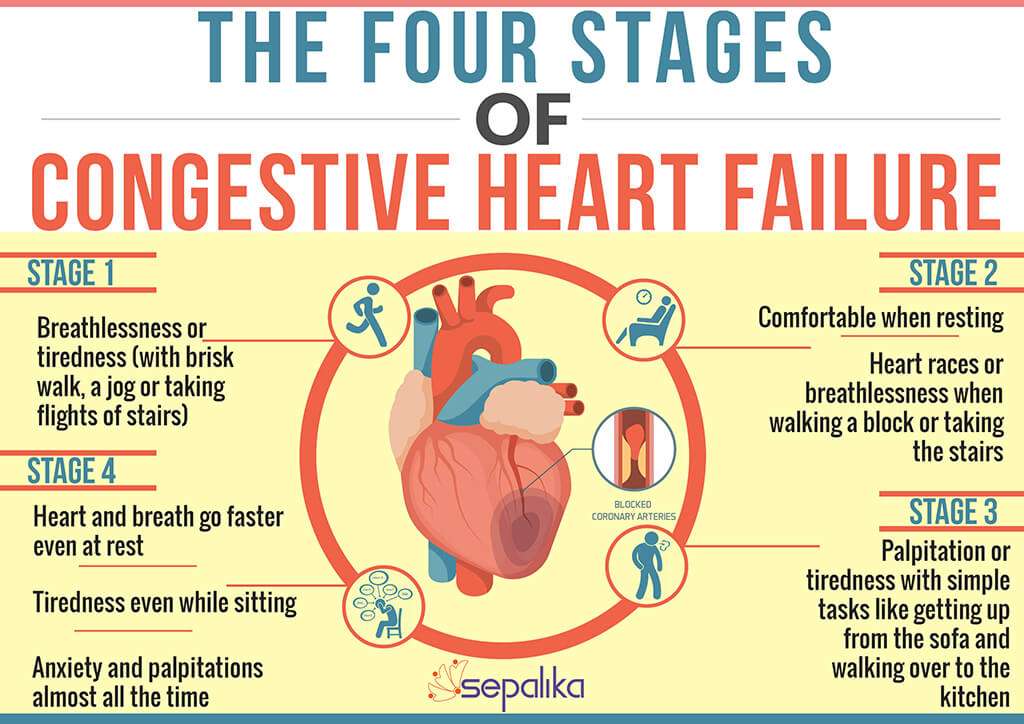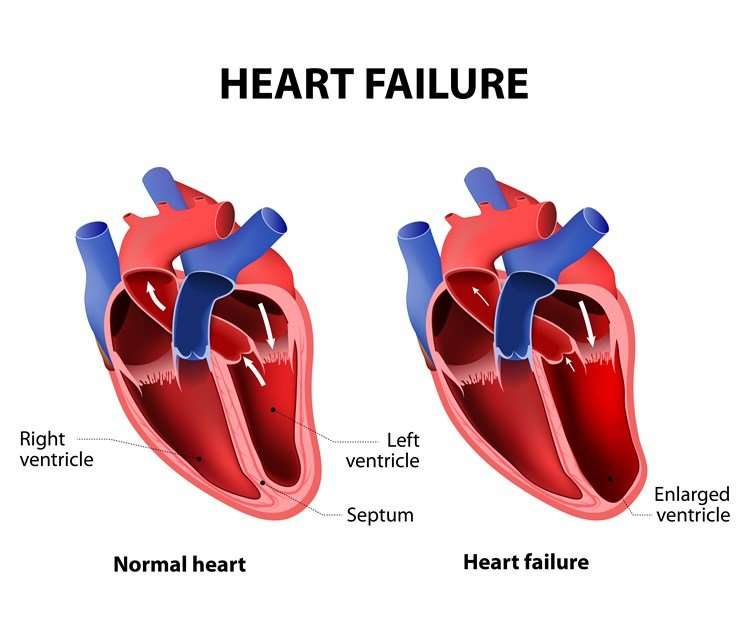Factors That Can Worsen Symptoms Of Heart Failure
The symptoms of heart failure can be worsened by a number of factors, including:
- anaemia
- too much salt, fluid, or alcohol in the diet
- pregnancy
- some viral and bacterial infections
- kidney diseases
Treatment for heart failure may include:
- medicines, such as;
- diuretics to remove excess fluid and improve symptoms of heart failure
- mineralcortiocoid receptor antagonists are also recommended and used in most patients with heart failure to reduce mortality and hospitalisation
- ACE inhibitors to open up blood vessels, reduce blood pressure and reduce sodium retention and water retention
- certain beta-blockers to slow the heart rate and reduce its work
- aldosterone blockers to reduce blood pressure and reduce the effects of damage to the heart muscle
- ACE inhibitors, beta blockers and aldosterone blockers can increase survival and reduce the likelihood of hospitalisation.
What Is Heart Failure
Heart failure doesnât mean the heart has stopped working. Rather, it means that the heart works less efficiently than normal. Due to various possible causes, blood moves through the heart and body at a slower rate, and pressure in the heart increases. As a result, the heart canât pump enough oxygen and nutrients to meet the body’s needs.
The chambers of the heart may respond by stretching to hold more blood to pump through the body or by becoming stiff and thickened. This helps to keep the blood moving, but the heart muscle walls may eventually weaken and become unable to pump as efficiently. The kidneys may respond by causing the body to retain fluid and salt. If fluid builds up in the arms, legs, ankles, feet, lungs, or other organs, the body becomes congested. Congestive heart failure is the term used to describe the condition.
What Is The Treatment For Congestive Heart Failure
The treatment of heart failure depends on the exact cause, but it can usually be treated effectively. The overall goals are to correct underlying causes, to relieve symptoms, and to prevent worsening of the condition. Symptoms are relieved by removing excess fluid from the body, improving blood flow, improving heart muscle function, and increasing delivery of oxygen to the body tissues. This can be done by the various congestive heart failure treatments listed in this sections.
If the underlying cause of heart failure is not correctable by surgery or catheterization procedures, medical treatment is composed of lifestyle changes and medications.
Recommended Reading: Acid Reflux Heart Fluttering
How Common Is Heart Failure
About 920,000 people in the UK currently have heart failure.There are around 67,000 admissions to hospital for heart failure in England and Wales each year. Heart failure becomes more common as people become older. It is commonly diagnosed in people in their 70s. In the UK around one in seven people aged 85 or more have heart failure. In people aged 65-74, around one in 35 have heart failure.
Nutrition Tips For Congestive Heart Failure

If you have congestive heart failure, follow these nutrition guidelines:
- Check food labels, and bound salt and sodium to 1,500 to 2,000 milligrams per day.
- Substitute salt and other high-sodium seasonings with replacements that have no salt or are low in sodium.
- While dining out, think about unrevealed sources of salt and sodium, such as salad dressings and soups. Ask for options low in salt and sodium.
- Select meats and other foods that are low in saturated fat to help in lowering your cholesterol levels.
- Avoiding alcohol is must. If your heart failure is caused by alcohol, its especially important that you dont drink any alcoholic beverages.
Read Also: List The Steps Of How To Calculate Your Target Heart Rate Zone
What Happens In Congestive Heart Failure
The heart has four chambers, a left atrium and right atrium and a left ventricle and right ventricle. Normally, blood:
But in heart failure, the heart cant pump the way it should. The blood and oxygen dont get to the organs. And blood backs up in the heart.;
Life Expectancy With Congestive Heart Failure
The life expectancy of someone with congestive heart failure depends on the type of heart failure, the cause, the stage of the disease, and how effective treatment is.
When heart failure results from cardiomyopathy or coronary artery disease, a person typically has a less positive outlook than someone with heart failure in its earliest stage.
Recommended Reading: Acid Reflux Cause Palpitations
What Is The Prognosis And Life Expectancy For Congestive Heart Failure
- The degree to which other organ systems are involved and the severity of other accompanying conditions
- The person’s symptoms and degree of impairment
- Other factors that remain poorly understood
With the availability of newer drugs to potentially favorably affect the progression of the disease, the prognosis in congestive heart failure is generally more favorable than that observed just 10 years ago. In some cases, especially when the heart muscle dysfunction has recently developed, a significant spontaneous improvement is not uncommonly observed, even to the point where heart function becomes normal.
Heart failure is often graded on a scale of I to IV based on the patient’s ability to function.
The prognosis of heart failure patients is very closely associated with the functional class.
An important issue in congestive heart failure is the risk of heart rhythm disturbances . Of those deaths that occur in individuals with congestive heart failure, approximately 50% are related to progressive heart failure. Importantly, the other half are thought to be related to serious arrhythmias.
What To Do When Youre Diagnosed With Congestive Heart Failure
Despite the word failure in the name, which can sound frightening to someone who receives a CHF diagnosis, individuals can live with CHF for years. Not all of CHF causes are reversible, but there are treatments and lifestyle changes that you can make to minimize symptoms and improve your lifestyle.
Your doctor will help you put together a treatment plan to minimize your symptoms based on the cause of your CHF. Some lifestyle changes that your doctor might recommend may include:
- Regular exercise
- Controlling high blood pressure
Don’t Miss: How Much Blood Does The Heart Pump
What Causes Congestive Heart Failure
You may develop CHF due to coronary artery disease or high blood pressure. Such conditions gradually leave your heart too weak or stiff to work effectively. CHF is more common in people who are 65 years old or older. Men, African Americans, those who are overweight, and people who have had a heart attack are also at greater risk.
What Happens To Someone With Congestive Heart Failure
What happens to someone with congestive heart failure? Heart failure sometimes known as congestive heart failure occurs when the heart muscle doesnt pump blood as well as it should. When this happens, blood often backs up and fluid can build up in the lungs, causing shortness of breath.
What are the final stages of congestive heart failure?;The symptoms of end-stage congestive heart failure include dyspnea, chronic cough or wheezing, edema, nausea or lack of appetite, a high heart rate, and confusion or impaired thinking. Learn about the hospice eligibility requirements for end-stage heart failure.
What is the life expectancy of someone with congestive heart failure?;Although there have been recent improvements in congestive heart failure treatment, researchers say the prognosis for people with the disease is still bleak, with about 50% having an average life expectancy of less than five years. For those with advanced forms of heart failure, nearly 90% die within one year.
How do congestive heart failure patients die?;Approximately 90% of heart failure patients die from cardiovascular causes. Fifty per cent die from progressive heart failure, and the remainder die suddenly from arrhythmias and ischaemic events.
Also Check: Does Acid Reflux Cause Heart Palpitations
What Are The Types Of Heart Failure
Systolic dysfunction happens when the heart muscle doesn’t contract with enough force, so there is less oxygen-rich blood pumped throughout the body.
Diastolic dysfunction happens when the heart contracts normally, but the ventricles donât relax properly or are stiff, and less blood enters the heart during normal filling.
A calculation done during an echocardiogram, called the ejection fraction , is used to measure how well your heart pumps with each beat to help determine if systolic or diastolic dysfunction is present. Your doctor can discuss which condition you have.
Common Types Of Congestive Heart Failure

The most common type of congestive heart failure is the left-sided CHF. It occurs when the left ventricle of your heart does not pump blood properly.;
As congestive heart failure progresses, it might get difficult for you to breathe as the fluid builds up in the lungs.;
Left-sided congestive heart failure has two types:;
- Diastolic heart failure;
- Systolic heart failure;
The other type of congestive heart failure is the right-sided CHF. In this type, the right ventricle is unable to supply blood to your lungs.;
As a result, blood gets backed up in the vessels, causing a; buildup of fluid in your abdomen, lower extremities, and your vital organs.;
A person can get both right-sided and left-sided congestive heart failure at the same time. It usually begins at the left side of your heart, and if left untreated, travels to the right.;
Don’t Miss: Vitamin D3 And Heart Palpitations
Heart Muscle Disease Or Swelling
Any damage to the heart muscle, whether thanks to drug or alcohol use, viral infections or unknown reasons increases the risk of cardiac arrest.
Congestive Heart Failure Stages of Dying
Though there have been advancements made, 50% of patients with congestive heart failure will have an average life expectancy of five years. For individuals with advanced congestive heart failure, up to 90% will pass away within;one year. Individuals with congestive heart failure at a moderate stage will average;ten years. Death from congestive heart failure is nearly certain. The congestive heart failure stages of dying are as follows:
- Dyspnea
Recommended Reading: What Causes Low Blood Pressure And High Heart Rate
What Are The Symptoms Of Heart Failure
You may not have any symptoms of heart failure, or the symptoms may be mild to severe. Symptoms can be constant or can come and go. The symptoms can include:
- Congested lungs. Fluid backup in the lungs can cause shortness of breath with exercise or difficulty breathing at rest or when lying flat in bed. Lung congestion can also cause a dry, hacking cough or wheezing.
- Fluid and water retention. Less blood to your kidneys causes fluid and water retention, resulting in swollen ankles, legs, abdomen , and weight gain. Symptoms may cause an increased need to urinate during the night. Bloating in your stomach may cause a loss of appetite or nausea.
- Dizziness, fatigue, and weakness. Less blood to your major organs and muscles makes you feel tired and weak. Less blood to the brain can cause dizziness or confusion.
- Rapid or irregular heartbeats. The heart beats faster to pump enough blood to the body. This can cause a rapid or irregular heartbeat.
If you have heart failure, you may have one or all of these symptoms or you may have none of them. They may or may not indicate a weakened heart.
Don’t Miss: Does Acid Reflux Cause Heart Palpitations
Congestive Heart Failure Treatments
Currently, there is no cure for congestive heart failure. Treatments are designed to reduce symptoms and slow the progression of the disease. However, early diagnosis and treatment can help you lead a long and active life. The good news is that more congestive heart failure treatment options exist today than ever before. The specific treatment plan prescribed for you will depend largely upon the type of heart failure you have and on its underlying causes. All treatment options will have the same four basic goals:
1. Treat the underlying diseases and conditions causing your heart failure.
2. Reduce the symptoms of heart failure.
3. Stop your heart failure from getting worse.
4. Maximize the quality and length of your life after diagnosis.
Treatment options for congestive heart failure will fall under one of four categories:
Just Diagnosed With Congestive Heart Failure What To Do Now
- Posted on
- In Healthy Lifestyle Tips
Congestive heart failure is a chronic, progressive condition affecting nearly six million Americans. Approximately 670,000 new cases are diagnosed in the U.S. every year. CHF is the leading cause of hospitalization in people over age 65.
Individuals diagnosed with CHF face difficult questions. How can they minimize their symptoms and prolong their life? What does a CHF diagnosis mean for their lifestyle? What precautions do they need to take to mitigate the chance of a catastrophic event? If you are among the hundreds of thousands of individuals diagnosed with CHF this year, learn how to protect yourself and live in comfort with your condition.
Also Check: Does Acid Reflux Cause Heart Palpitations
What Is The Outlook For Heart Failure Patients
Very good, particularly now compared to prior generations, says Dr. Jacoby. We have medicines and treatments that reverse many cases of heart failure, and in most cases, the outlook is generally very good.
In cases where reversal of damage to the heart and affected areas is not possible, Dr. Jacoby says that the Yale Medicine team follows the patient closely and works to optimize quality of life while treating him or;her.
Causes Of Heart Failure
The heart is a double pump made up of four chambers. Deoxygenated blood from the veins enters the right upper chamber , is passed to the right lower chamber , and then pumped to the lungs.
Oxygenated blood from the lungs enters the left upper chamber and then enters the left lower chamber . The blood is then pumped around the body, under pressure, via arteries.
In a person with heart failure, one or both ventricles dont empty properly. This leads to increased pressure in the atria and the nearby veins. This backlog of blood can affect the kidneys and lungs interfering with their function and leading to a build-up of fluid ;in the lungs, abdominal organs and legs.
In some people with heart failure, rather than failed pumping of the blood from the ventricle, there is failed relaxation of the ventricle.
If the heart is not pumping and becomes stiff and unable to relax, it can cause the blood to pool in the hearts ventricles. This can cause pressure build up and can put strain on the heart.
Heart failure can be caused by several conditions, including:
You May Like: What Branch Of Medicine Deals With Heart Disease
When To Get Medical Advice
See a GP if you experience persistent or gradually worsening symptoms of heart failure.
Call 999 for an ambulance or go to;your nearest A&E department as soon as possible if you have sudden or very severe symptoms.
A number of tests can be used to help check how well your heart is working,;including blood tests, an;ECG and an echocardiogram.
Weight Loss Diabetes And Obesity

A 2018 study published in the Canadian Journal of Diabetes suggests that a sustained weight loss of more than 5% of body weight will lead to an improvement in glycemic control and cardiovascular risk factors.;By employing healthy lifestyle choices such as exercise, eating a better diet, and other behavior interventions, both weight loss and lowering hemoglobin A1C can be reached.;
Medication to manage weight may improve glycemic and metabolic control in both people with diabetes and obese patients, and, when deemed appropriate, bariatric surgery may be an option for obese and diabetic patients.
Before you begin any sort of weight-loss program, consult with your cardiologist and diabetes management team first.
Also Check: What To Do When Someone Has A Heart Attack
What Are The Symptoms Of Mild Congestive Heart Failure
The patient may experience bouts of fluid retention and weight gain, shortness of breath on exertion, and decreased exercise tolerance. Some patients may have significant problems with swelling of their legs. This may lead the patient to depression and frustration because they can no longer do their regular activities and are having to rely more on their families. Sometimes the patient can feel the heart racing as a consequence of the heart function being reduced.
You May Like: How Can I Lower My Heart Rate From Anxiety
How Is Chf Diagnosed
After reporting your symptoms to your doctor, they may refer you to a heart specialist, or cardiologist.
The cardiologist will perform a physical exam, which will involve listening to your heart with a stethoscope to detect abnormal heart rhythms.
To confirm an initial diagnosis, a cardiologist might order certain diagnostic tests to examine your hearts valves, blood vessels, and chambers.
There are a variety of tests used to diagnose heart conditions. Because these tests measure different things, your doctor may recommend a few to get a full picture of your current condition.
Recommended Reading: Is 190 Heart Rate Bad
